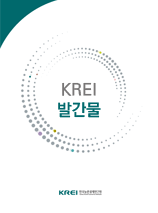
- A Study on the Establishment of Evaluation Guidelines for Agricultural ODA Projects
-

-
Following the recommendation from the Prime Minister's Office, this study introduces evaluation guidelines for agricultural ODA projects to enhance and improve their quality. The main objectives to evaluate the agricultural ODA projects are feedback and accountability, and the evaluation principles are impartiality, independence, credibility, usefulness, and partnership.
Targets of these guidelines are the projects implemented by the Ministry of Agriculture, Food and Rural Affairs (MAFRA) and its affiliated organizations. In selecting projects to be evaluated, budget availability, the scale of the projects, and political consideration need to be addressed. The managing body for evaluation will be either MAFRA (in case the projects have been implemented by the Korea Rural Community Corporation or KRC), or the KRC (in case the projects have been implemented by other agents).
Considering that the evaluation in the agricultural sector is only at its beginning stage, it is recommended to focus for now on evaluations which will be performed at the project's closing period and expost evaluations.
An Evaluation Committee headed by a Director General of International Cooperation of MAFRA needs to be set up to discuss and decide on key issues including deliberation of annual evaluation plans, selection of projects to be evaluated and an evaluation agency, and so on.
This study also introduces some of evaluation or result-based management models as well as guidelines on setting up evaluation indicators to be used in the evaluation process. It is recommended to use a Project Design Matrix (PDM) when a project initiating document is prepared so that the results of the projects can be easily compared with the original status. A baseline survey will be of tremendous importance for this.
Evaluation results need to be reported to the Prime Minister's Office which takes charge of managing the International Development Cooperation Committee headed by the Prime Minister, and then open to the public through websites. The English abstracts of the reports can be sent to the Network on Development Evaluation of OECD so as to be open to the wider public.
Two levels of tasks will be derived from the evaluations: tasks to be institutionally improved and follow-up management tasks. MAFRA and a project management agent (e.g. the KRC) will work on the former and the latter, respectively.
Researchers: Jang Heo, Seong-Tae Ji
Research period: 2013. 11. ~ 2014. 1.
E-mail address: heojang@krei.re.kr -
목차
-
제1장 서 론
제2장 평가기획, 시행 및 결과보고
제3장 평가모형, 평가지표 및 평가방법
제4장 평가 결과의 활용
제5장 평가지침(안)
요약문
Following the recommendation from the Prime Minister's Office, this study introduces evaluation guidelines for agricultural ODA projects to enhance and improve their quality. The main objectives to evaluate the agricultural ODA projects are feedback and accountability, and the evaluation principles are impartiality, independence, credibility, usefulness, and partnership.
Targets of these guidelines are the projects implemented by the Ministry of Agriculture, Food and Rural Affairs (MAFRA) and its affiliated organizations. In selecting projects to be evaluated, budget availability, the scale of the projects, and political consideration need to be addressed. The managing body for evaluation will be either MAFRA (in case the projects have been implemented by the Korea Rural Community Corporation or KRC), or the KRC (in case the projects have been implemented by other agents).
Considering that the evaluation in the agricultural sector is only at its beginning stage, it is recommended to focus for now on evaluations which will be performed at the project's closing period and expost evaluations.
An Evaluation Committee headed by a Director General of International Cooperation of MAFRA needs to be set up to discuss and decide on key issues including deliberation of annual evaluation plans, selection of projects to be evaluated and an evaluation agency, and so on.
This study also introduces some of evaluation or result-based management models as well as guidelines on setting up evaluation indicators to be used in the evaluation process. It is recommended to use a Project Design Matrix (PDM) when a project initiating document is prepared so that the results of the projects can be easily compared with the original status. A baseline survey will be of tremendous importance for this.
Evaluation results need to be reported to the Prime Minister's Office which takes charge of managing the International Development Cooperation Committee headed by the Prime Minister, and then open to the public through websites. The English abstracts of the reports can be sent to the Network on Development Evaluation of OECD so as to be open to the wider public.
Two levels of tasks will be derived from the evaluations: tasks to be institutionally improved and follow-up management tasks. MAFRA and a project management agent (e.g. the KRC) will work on the former and the latter, respectively.
Researchers: Jang Heo, Seong-Tae Ji
Research period: 2013. 11. ~ 2014. 1.
E-mail address: heojang@krei.re.kr저자정보
저자에게 문의
구매안내
KREI의 출판물은 판매 대행사 (정부간행물판매센터)와 아래 서점에서 구입 하실 수 있습니다.
판매대행사
- (주)정부간행물판매센터http://www.gpcbooks.co.kr사이트 바로가기
- 서울특별시 중구태평로 1가 25번지
- TEL 02) 394-0337, 734-6818
- FAX 02) 394-0339
판매서점
판매서점 교보문고 http://www.kyobobook.co.kr/ 영풍문고 http://www.ypbooks.co.kr/ 알라딘 http://www.aladin.co.kr/ 활용도 정보
활용도 정보 상세정보 조회 좋아요 다운로드 스크랩 SNS공유 53058 1 67 0 3 - 같은 분야 보고서가 없습니다.
- 같은 분야 인기 보고서가 없습니다.
의견남기기
-


